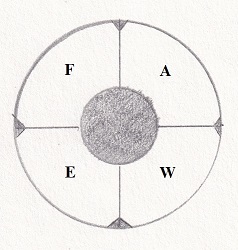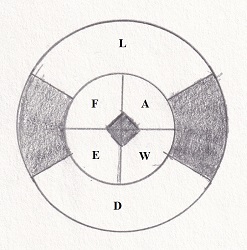The Elements
Every Challenge targets one element. We’d best take a look at how these elements work!
Each element defines an approach to the problem at hand. Most of the time, you will be able to choose from at least one approach. Once chosen, this is the same element that you Challenge against.
Naturally, the best element will vary based on your strengths, your opponents, and the circumstances.
| Element | Challenges of the … | Approach |
|---|---|---|
| Air | Mind | Intellectual |
| Water | Folk | Social |
| Earth | World | Physical |
| Fire | Creative spirit | Creative |
For example, consider an attempt to infiltrate a noble estate during a gala. You might choose Water to blend in with the crowd and move discretely; Earth to sneak in through the garden unseen; or Fire to arrive as a performer in costume.
In turn, the Storyteller reacts to your choices. Certain approaches might be naturally easier (lower Difficulty) or come with complications.
- Chose Water? You might meet a villain who recognizes you on sight! How will you maintain decorum when they start to drop hints about your real identity?
- Chose Earth? You can avoid a lot of trouble if you are unseen, but the guards will treat an obvious intruder with prejudice if you are seen!
- Choose Fire? You had best put on a show worthy of the nobility, and what happens when the scheduled performer shows up on stage for a musical duel?
Depending on circumstance, an element is might be more difficult or useless. For example, no amount of interpersonal grace will solve falling at high speed towards rocky ground!
Defining the elements
The four concrete elements form a circle:
Air <-> Water <-> Earth <-> Fire <-> Air
The two ephemeral elements are Light and Dark.
The Ephemeral elements cannot be accessed directly. Instead, they blend with one of the concrete elements to form a hybrid.
- Such as LightAir, LightEarth, DarkAir, DarkEarth, etc
- You will weave the ephemeral elements into your own spirit through Harmonies as you cultivate
Shifting
To Shift an element, move one step along this path. For example, one Shift would transform Air to Water or Air to Fire. Two shifts would reach Earth on the opposite side of the wheel.
Associations
In theory, each element contains the world. In practice, however, the elements described here are based on Kingdom Arts and learning. There may be significant deviation for individual Cultivators. Indeed, many Path Powers explicitly interpret the elements in radically different fashion than the defaults here.
When it comes to Paths, rules are made to be broken!
Bane
Every Path comes with a price. To grasp one element, you weaken another.
Each Path has one or two Bane elements. This element is more difficult to cultivate, grants less benefits, and often blocks your cultivation forward.
- You may not choose your Bane element as a Grace nor strengthen it at character creation
- As a result, the Ki strength of your Bane is locked to d6
- You will gain less Chakra and Charge in your Bane
However, you are still capable of manipulating your Bane element. To be strictly technical, your Bane is not weaker than a normal person (for whom all Ki strength would be d6); rather, it cultivates less than your empowered elements.
Your Bane is set when you take your Path at character creation. Characters without a Path do not have a Bane.
Charge
Charge is your latent store of elemental power, used to power your Arts. Think of it as the equivalent to MP from your favorite JRPG.
You store Charge in each element individually. The amount of Charge you can hold will vary depending on how you Cultivate; use equipment as a reserve to cover weak elements.
Uses for Charge:
- Spend 1 matching Charge to grant +C to your current Challenge
- Spend 1 matching Charge to aid an ally, granting them +C to a Challenge
- Spend Charge as part of certain Arts to power or strengthen the Art (cost varies)
- …and quite a few unique effects described at various places through this guide!
Charge resets to full at the start of every new Scene.
If you need more Charge mid-Scene, consider:
- Consume potions for a quick pick-me-up
- Tap into elemental ley lines and enjoy that sweet, sweet rush of power
- With a slight chance to explode
- Seek Flourishes to regenerate Charge
- By Path-specific strategies, laid out in the Path section
Unfortunately, Charge does have some downsides.
- More Charge makes you a lightning rod for elemental effects
- Expending Charge raises the elemental reactivity of the Scene
- In other words, Charge makes things start to go boom
If you are worried about the downsides, you can Ground your Charge as an Action. (Actions are detailed in the Encounters section)
- You must be in contact with ground or water
- You choose an amount of Charge up to release, up to your maximum
- That Charge instantly sinks into the environment without raising the scene’s elemental reactivity
Randomly selecting an element
If either players or the storyteller need to randomly select an element, roll 1d10
| Result | Element |
|---|---|
| 1 | Light |
| 2,3 | Air |
| 4,5 | Water |
| 6,7 | Earth |
| 8,9 | Fire |
| 10 | Dark |

